Pro-Russian candidate leads amid accusations of Kremlin interference
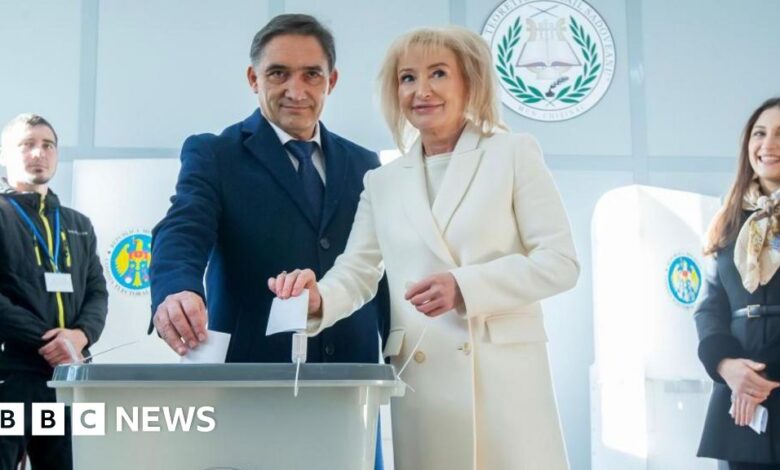
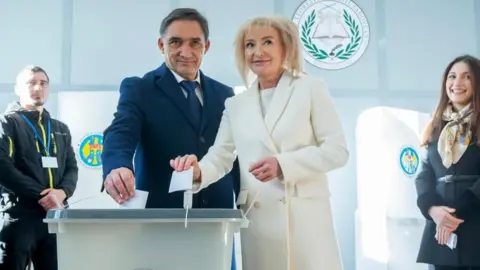 EPA-EFE/REX/Shutterstock
EPA-EFE/REX/ShutterstockMoldova’s pro-EU leader Maia Sandu’s challenger for the presidency has a narrow lead in a crucial presidential election seen as a choice between Europe and Russia, according to preliminary results.
Alexandr Stoianoglo, who is backed by the pro-Russian Socialist Party, has promised closer ties with Moscow, after Sandu led Moldova into EU membership talks.
The Central Election Commission said that with more than 90% of the votes counted, Stoianoglo had 50.5% of the votes and Sandu had 49.5%.
During the vote, the president’s national security adviser said there had been “major interference” from Russia in Moldova’s election process and there was a “high possibility of distorting the results”.
Russia has denied meddling in the vote, which comes a week after another key Eastern European election in Georgia, where the president said it was a “Russian special operation”.
Alexandr Stoianoglo, who Sandu fired as prosecutor general, has denied supporting the Kremlin.
Voting ended in Moldova at 21:00 (19:00 GMT), with a turnout of 54%, higher than four years ago and especially high among foreign voters at polling stations. votes abroad.
The results are likely to become even closer as results from polling stations in the EU and US become clear. The final results will be announced on Monday.
As the polls closed, both Maia Sandu and her opponent thanked voters, with Stoianoglu speaking in Russian as well as Romanian. Although Romanian is the main language of Moldova, Russian is widely used due to its Soviet past.
When he voted, he promised to be an “apolitical president” for the people, telling reporters that he voted for “a Moldova that will develop in harmony with both the West and the East”.
Moldovan media reported that Stoianoglu polled particularly well in rural and southern regions, while Sandu led in cities and abroad.
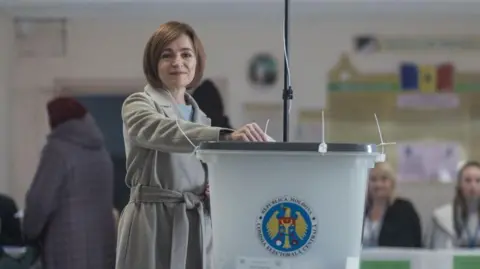 Diego Herrera Carcedo/Anadolu
Diego Herrera Carcedo/AnadoluSandu appealed after voting for the people of Moldova to defend their independence, while warning about “thieves” seeking to buy their votes and their country.
President’s national security adviser Stanislav Secrieru said Russia organized buses and large charter flights to take voters to polling stations.
Bomb threats briefly disrupted voting in Moldova, at UK polling stations in Liverpool and Northampton and in Frankfurt and Kaiserslautern in Germany, he added.
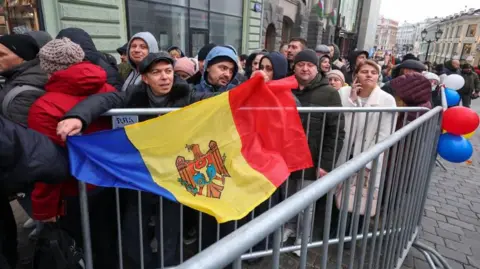 EPA-EFE/REX/Shutterstock
EPA-EFE/REX/ShutterstockA Soviet republic for 51 years, Moldova is located next to Ukraine and Romania and is one of Europe’s poorest countries. It has a population of 2.5 million and a foreign population of 1.2 million.
Moldovan authorities have long warned that a fugitive oligarch named Ilan Shor spent $39 million trying to bribe Moscow’s election with grants to 138,000 Moldovans.
Shor, who is based in Moscow, denies wrongdoing but has promised cash payments to anyone willing to back his “firm no” call for the EU.
Commentators and politicians have warned that Stoianoglu’s victory could radically change the political landscape in the Danube and Black Sea region, not least because he is some kind of “Trojan horse”. that, but because Russia supported him.
There were long queues at polling stations in Moscow, Italy and among voters from the mainly Russian-speaking breakaway region of Transnistria, who had to cross the Dniester River into Moldova-controlled territory to vote. vote. Transnistria is home to a Russian military base and a huge arsenal of weapons.
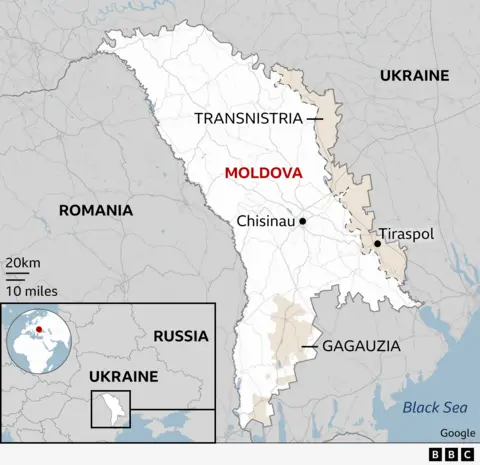
Moldova’s election commission said it was aware of reports of organized and illegal transport of voters by air and road in Russia, Belarus, Azerbaijan and Türkiye, and called on public they report subsequent violations.
Although Sandu easily won the first round of voting, several candidates stood behind Stoianoglo, although the third-placed candidate refused to support either of them.
The first round coincided with a fierce referendum in favor of constitutional change that included a commitment to join the EU.
In the end, the vote passed by a slim margin and Maia Sandu said there was clear evidence of an attempt to buy 300,000 votes.





